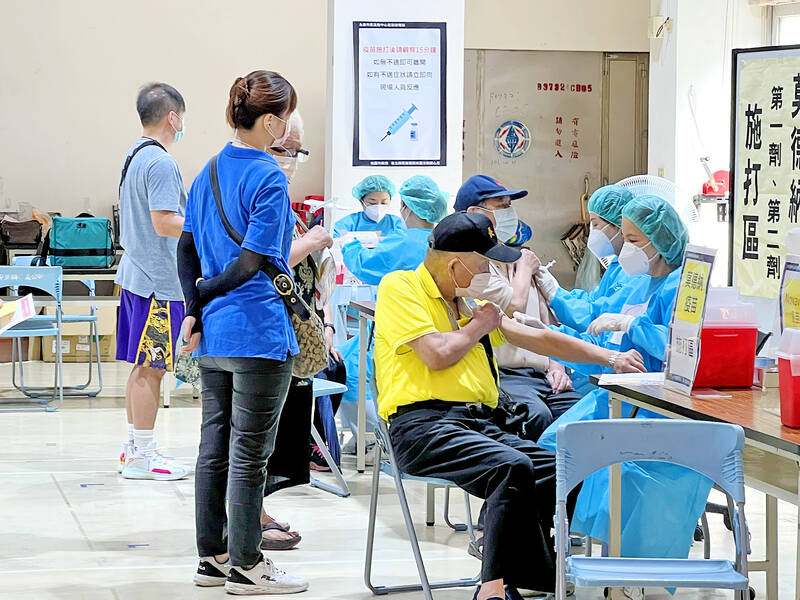The Central Epidemic Command Center (CECC) yesterday reported 46,795 local COVID-19 cases, the highest caseload in 83 days, while the number of daily prescribed antivirals for treating the disease was the highest in 78 days.
Centers for Disease Control (CDC) Deputy Director-General Chuang Jen-hsiang (莊人祥), the CECC’s spokesman, said 46,795 new local infections, 256 imported cases and 17 deaths were confirmed yesterday.
The local caseload is the highest since June 23 and an increase of 28.6 percent compared with Tuesday last week, but the spike might also be partially caused by people waiting to seek medical treatment until after the Mid-Autumn Festival long weekend, Chuang said.

Photo: Chen En-hui, Taipei Times
The most cases were reported in New Taipei City, with 9,618, followed by Taichung with 6,081, Taipei with 5,619, Taoyuan with 4,519, Kaohsiung with 3,928, Tainan with 3,028, Changhua County with 2,217, Hsinchu County with 1,329, Pingtung County with 1,304, Yunlin County with 1,157, Miaoli County with 1,156, Yilan County with 1,059, and 10 other administrative regions with fewer than 1,000 cases each.
CDC Deputy Director-General Philip Lo (羅一鈞), deputy head of the CECC’s medical response division, said the 17 people who died were aged 50 or older and had chronic diseases.
Twelve people among them had not had a COVID-19 booster shot, Lo said.
The number of oral antivirals prescribed on Monday to treat COVID-19 increased to 8,816 courses — 6,853 of Paxlovid and 1,963 of molnupiravir, he said, adding that it is the highest daily number since June 27.
There were 14,427 reported cases of reinfection as of Monday, he said, adding that people who are diagnosed as being reinfected can receive prescription antiviral drugs or a traditional herbal formula known as Taiwan Chingguan Yihau, or NRICM101, if they meet the prescription criteria, Lo said.
The antiviral drugs and the formula should not be taken at the same time to avoid unwanted interactions between them, he said.
The two definitions of COVID-19 reinfection are “testing positive with an antigen test, a rapid nucleic acid amplification test (NAAT), or a polymerase chain reaction (PCR) test with a cycle threshold (Ct) value lower than 27, and an onset of worsened symptoms within one to three months since the previous onset or testing date of COVID-19 infection” and “testing positive with an antigen test, a NAAT or a PCR test with a Ct value lower than 30, asymptomatic or symptomatic, at least three months after previous onset or testing date of the COVID-19 infection,” he said.
The meaning of “worsened symptoms” includes the onset of new symptoms, such as a fever or respiratory symptoms; worsening of chronic conditions; or being asymptomatic in the previous infection and subsequently having symptoms, he said.
If a previously infected person has new or worse symptoms, and tests positive again with a rapid test kit, they can seek medical attention through telemedicine or an in-person clinical visit, and be diagnosed and reported as a reinfection case by a doctor, he said.
The doctor can also prescribe oral antivirals or other drugs, so people should not rush to a hospital to get a PCR test if they suspect themselves to be reinfected, Lo said, adding that the procedure of receiving a home isolation notice is the same as for a first infection.

Taiwan is stepping up plans to create self-sufficient supply chains for combat drones and increase foreign orders from the US to counter China’s numerical superiority, a defense official said on Saturday. Commenting on condition of anonymity, the official said the nation’s armed forces are in agreement with US Admiral Samuel Paparo’s assessment that Taiwan’s military must be prepared to turn the nation’s waters into a “hellscape” for the Chinese People’s Liberation Army (PLA). Paparo, the commander of the US Indo-Pacific Command, reiterated the concept during a Congressional hearing in Washington on Wednesday. He first coined the term in a security conference last

Prosecutors today declined to say who was questioned regarding alleged forgery on petitions to recall Democratic Progressive Party (DPP) legislators, after Chinese-language media earlier reported that members of the Chinese Nationalist Party (KMT) Youth League were brought in for questioning. The Ministry of Justice Investigation Bureau confirmed that two people had been questioned, but did not disclose any further information about the ongoing investigation. KMT Youth League members Lee Hsiao-liang (李孝亮) and Liu Szu-yin (劉思吟) — who are leading the effort to recall DPP caucus chief executive Rosalia Wu (吳思瑤) and Legislator Wu Pei-yi (吳沛憶) — both posted on Facebook saying: “I

The Ministry of Economic Affairs has fined Taobao NT$1.2 million (US$36,912) for advertisements that exceed its approved business scope, requiring the Chinese e-commerce platform to make corrections in the first half of this year or its license may be revoked. Lawmakers have called for stricter enforcement of Chinese e-commerce platforms and measures to prevent China from laundering its goods through Taiwan in response to US President Donald Trump’s heavy tariffs on China. The Legislative Yuan’s Finance Committee met today to discuss policies to prevent China from dumping goods in Taiwan, inviting government agencies to report. Democratic Progressive Party Legislator Kuo Kuo-wen (郭國文) said

Sung Chien-liang (宋建樑), who led efforts to recall Democratic Progressive Party (DPP) Legislator Lee Kun-cheng (李坤城), was released on bail of NT$80,000 today amid outcry over his decision to wear a Nazi armband to questioning the night before. Sung arrived at the New Taipei District Prosecutors’ Office for questioning in a recall petition forgery case last night wearing a red armband bearing a swastika, carrying a copy of Adolf Hitler’s Mein Kampf and giving a Nazi salute. Sung left the building at 1:15am without the armband and covering the book with his coat. Lee said today that this is a serious